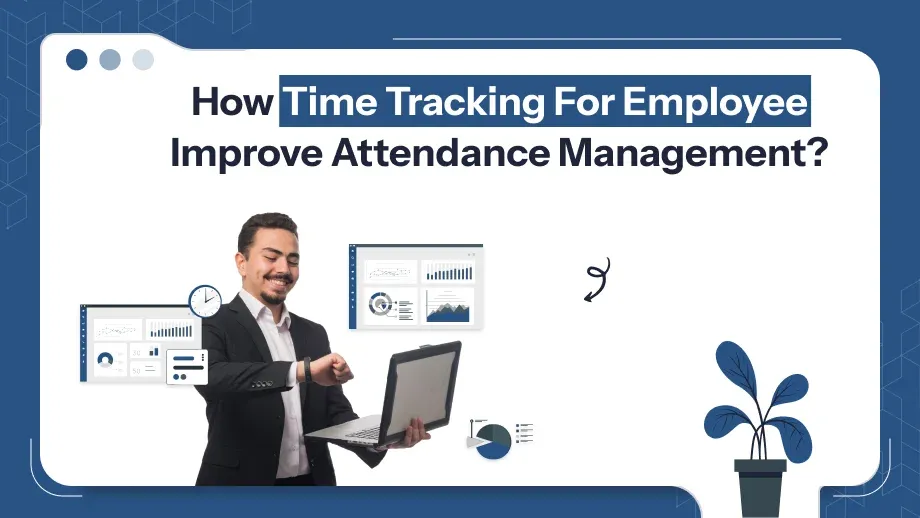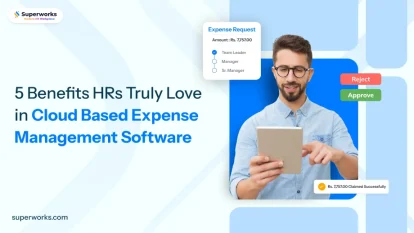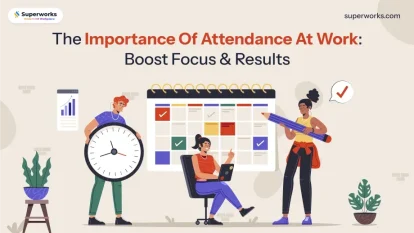
Managing attendance management is one of the most crucial activities for running a successful business. Ineffective time management concerning attendance will lead to payrolls, compliance risk, and diminished productivity. Time tracking for employee revolutionizes how businesses monitor, manage, and optimize attendance.
What Is Time Tracking for Employees?
Time tracking for employees is the process of tracking and recording the time at work by employees. This can be done manually, but modern businesses rely on electronic systems, such as employee time tracking, to make it seamless.
Types of Time Tracking Systems
- Manual Systems: Paper logs or spreadsheets to record hours worked.
- Biometric Systems: Fingerprint or facial recognition to clock in and out.
- Digital Systems: Tools like time tracking employees software or cloud based HRMS software for real-time tracking.
By automating the process, businesses can minimize errors and focus on more strategic goals.
Importance of Attendance Management
Attendance management is crucial in ensuring efficiency in any kind of operation because of its direct impact on the positive work environment. The following are why it matters:
- Payroll Accuracy: Attendance data directly impacts payroll calculations. Errors in attendance can lead to overpayment or underpayment.
- Compliance: Adhering to labor laws requires accurate attendance records.
- Productivity Tracking: Employee time tracking provides insights into employee performance and efficiency.
- Employee Satisfaction: Transparent attendance management fosters trust and fairness among employees.
Traditional attendance systems often fall short, so integrating employee time and tracking software into operations is crucial.
Optimize productivity effortlessly with our time tracking for employee solution.
Master time management and elevate efficiency today!
How Does Time Tracking for Employees Improve Attendance Management?
Modern employee time tracking systems offer significant advantages over manual methods. Here’s how they transform attendance management:
Real-Time Data Capture
Automated systems record employee attendance instantly, ensuring accuracy. Tools like employee time tracking programs or attendance management solutions make real-time tracking seamless and error-free.
Reduction in Administrative Work
Manual tracking requires significant time and effort. Automated tools reduce this burden, allowing HR teams to focus on strategic tasks. Solutions like HRMS payroll software in india streamline attendance and payroll integration.
Compliance Assurance
Accurate attendance data ensures that businesses comply with labor laws and company policies. Modern tools make it easier to track and report working hours.
Fairness and Transparency
With time tracking employee software, employees can view their logged hours and resolve discrepancies, promoting transparency and trust.
Enhanced Reporting and Insights
Modern tools generate detailed attendance reports, helping managers make data-driven decisions. These reports identify trends like absenteeism and overtime, enabling better resource planning.
Benefits of Time Tracking for Employees
Investing in time tracking for employees provides a range of benefits for businesses:
Improved Accountability
Automated systems encourage employees to adhere to schedules. This reduces tardiness and absenteeism.
Cost Savings
Accurate attendance records prevent overpayment, saving money on payroll. hr management tools like time tracking for employees also reduce the need for manual interventions, cutting administrative costs.
Increased Employee Satisfaction
Transparency in attendance and payroll fosters trust. Employees appreciate systems that ensure they are paid fairly for their work hours.
Better Resource Allocation
Detailed attendance insights help managers allocate resources effectively, especially during peak times.
Scalable Solutions
Modern employee time tracking program can adapt to business growth, making them ideal for startups and large enterprises alike.
Features of Modern Time Tracking Tools
Modern time tracking for employees is designed to do more than just record attendance.
These tools have evolved with advanced features that make attendance management easier, more accurate, and more efficient. Let’s look at the key features of today’s employee time tracking software and how they contribute to a seamless workflow.
Biometric Integration
Biometric systems are based on fingerprint, facial recognition, or iris scans for the clock-in and clock-out of employees to minimize the chances of time thefts, such as “buddy punching,” in which one employee clocks in for another.
Mobile Access
Mobile access allows employees to log their work hours through smartphones or tablets. This feature is particularly beneficial for businesses with remote teams or field employees.
Geolocation Tracking
Geolocation tracking uses GPS technology to monitor where employees are working. It’s especially useful for industries like construction, logistics, or sales, where employees are frequently on the move.
Integration with HR Systems
Modern time-tracking software is designed to seamlessly integrate with HRMS software in india, payroll systems, and other HR tools. This feature ensures that all attendance data flows directly into relevant systems without manual intervention.
Advanced Analytics
Advanced analytics will give a manager information on attendance patterns, overtime trends, and more detailed productivity metrics. Real-time dashboards shall allow the business to make proper and reasonable decisions based on forecasts while optimizing workforce numbers.
What Are the Different Ways to Track Employee Time?
Tracking the employees’ time has been considered an essential function when managing a workforce. It does not matter whether it’s a small company or a larger corporation, accurate payroll and conformity to labor standards can be established with the right way of tracking time. There is a variety of methods to accomplish this from older traditional approaches to current digital ways, so let us explore these and find the most practical one.
Manual Time Tracking
This involves manual time tracking by employees in which they have to record their working hours on paper timesheets or spreadsheets. Though simple, this method is very much dependent on the honesty and accuracy of employees.
Advantages
- Low-cost solution.
- Easy to implement for very small teams.
Punch Card Systems
The oldest method of time tracking for employee is punch card systems. Employees use actual punch cards to punch in and out of work for record purposes, which are then summed over a period for payroll purposes.
Advantages
- Simple to use and widely understood.
- Provides a physical record of attendance.
Biometric Time Tracking
Biometric systems monitor individual attendance using fingerprints, facial recognition, or iris scanning as unique identifiers. In such systems, there can be no cases of fraudulent entries.
Advantages
- Highly accurate and secure.
- Eliminates buddy punching and manual errors.
- Tracks real-time attendance.
Mobile Time Tracking Apps
The use of the mobile application has now made employee time tracking a favorite mode of keeping track of time at work because of the current remote and hybrid work culture. With the use of a smartphone, tablet, or laptop, employees can track their time from anywhere.
Advantages
- Perfect for remote teams or field employees.
- Includes features like geolocation tracking and notifications.
- Real-time updates to HR systems.
Automated Time Clocks
Automated time clocks are standalone devices that digitally track employee hours. These systems often integrate with payroll software, simplifying attendance management.
Advantages
- Easy to use and reliable.
- Reduces the risk of manual errors.
Examples of Time Tracking in Action
Transitioning to Automation
A company relying on manual logs implemented time tracking employee software. The switch reduced errors, improved payroll accuracy, and saved 15 hours per week in administrative tasks.
Managing Remote Teams
Using cloud-based HRMS software, a remote team tracked work hours accurately. This ensured fairness and productivity, even with a distributed workforce.
These examples highlight how time-tracking employees transform attendance management in various scenarios.
Best Practices for Implementing Employee Time Tracking
For businesses to derive maximum benefit from time tracking for employees, there are best practices as follows:
- Educate Employees: Explain the purpose and benefits of the system to gain their buy-in.
- The right tool: Choose solutions like the best HRMS solutions that fit your size and business needs.
- Monitor Performance: Regularly review the system’s effectiveness and address any issues.
- Ensure Compliance: Use tools that adhere to labor laws and company policies.
- Encourage Transparency: Allow employees to access their attendance records to foster trust.
Technology’s Impact on Time Tracking for Employees
Technology has revolutionized employee time tracking, making attendance management more efficient and accurate.
Integration with HRMS
Tools like online HRMS tool connect time tracking with payroll, onboarding, and other HR functions, streamlining operations.
Real-Time Data
Solutions like HRMS payroll software in India provide instant access to attendance data, reducing delays and errors.
Scalability
Modern employee time-tracking software adapts to the needs of businesses, whether they are startups or large corporations.
Enhanced Decision-Making
Analytics from tools like attendance management solutions provide insights that help managers plan better and optimize workforce utilization.
Conclusion
Time tracking for employee is very revolutionary in regards to attendance management practices. It becomes accurate, shows compliance, and is efficient to manage. Moreover, with the latest tools such as employee time-tracking software and even HRMS payroll software in India, businesses save time and boost the trust of the workforce. Therefore, advancing the solution which includes an attendance management solution, in turn, promises companies to go ahead with productive employee attendance management. It’s time to modernize your ways of attendance management with the right techniques!






